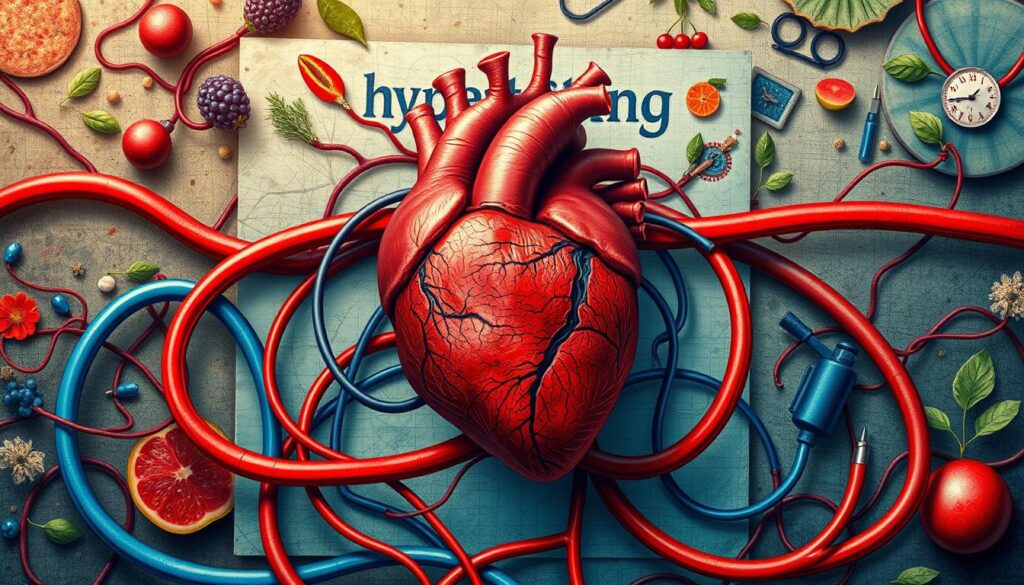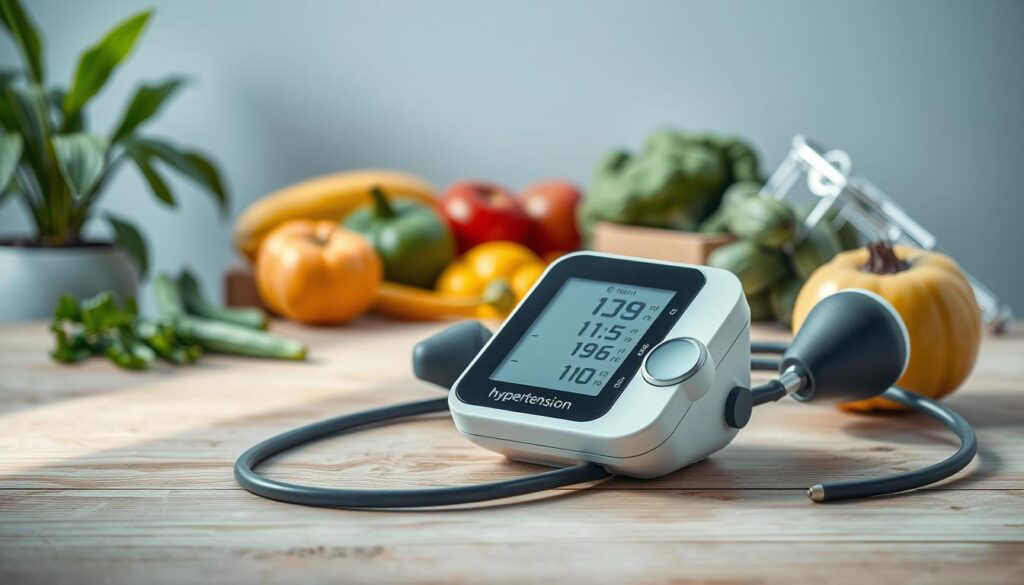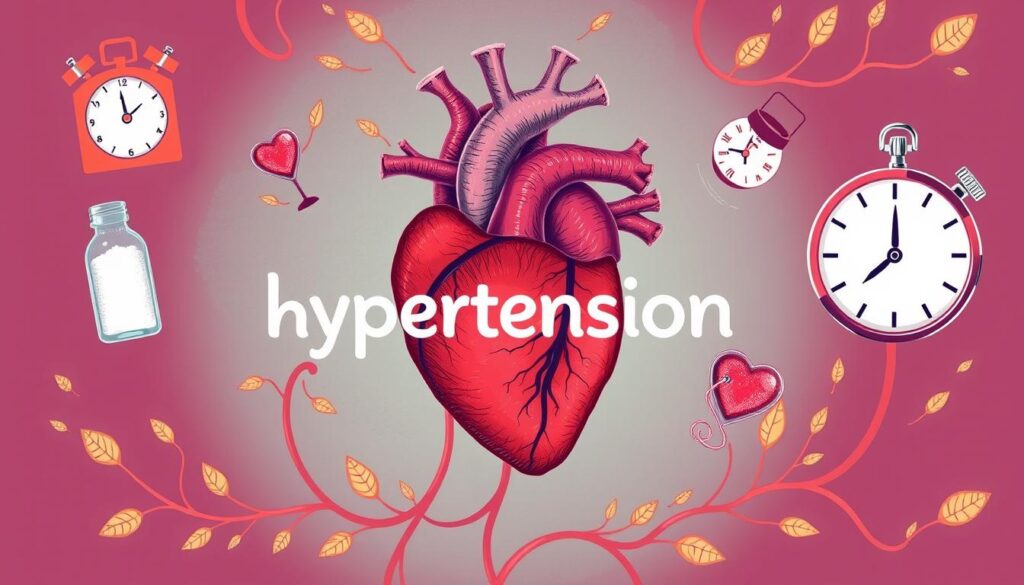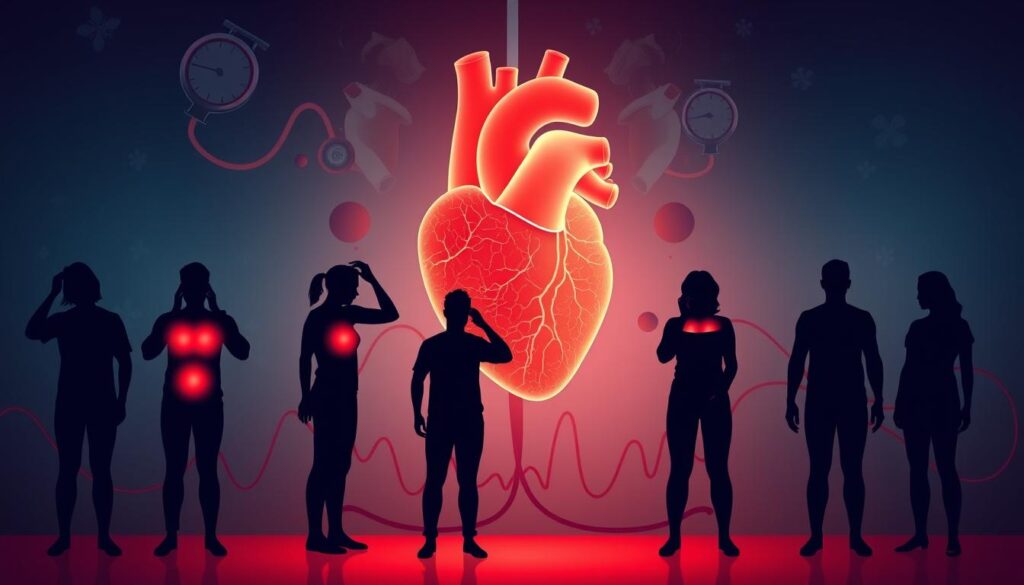Are you among the millions dealing with high blood pressure without knowing the causes or how to manage it? Hypertension, or high blood pressure, is a silent but common issue that affects heart health. But, there are simple ways to control your blood pressure and lower the risk of serious problems. Let’s explore this detailed guide to learn how to beat hypertension.

Hypertension is a major health issue affecting many people around the world. By looking into the causes and finding the best treatments, we can help you take charge of your heart health. Come along as we uncover the secrets of hypertension and find the way to a healthier life.
What is Hypertension: Understanding Blood Pressure Basics
Hypertension, or high blood pressure, affects millions globally. It happens when blood pressure against artery walls is too high. Blood pressure monitoring is key to managing it.
How Blood Pressure Readings Work
A blood pressure cuff wraps around your upper arm. It inflates and then deflates slowly. This lets healthcare providers measure systolic and diastolic pressure.
The systolic pressure shows blood force when your heart beats. The diastolic pressure shows pressure between heartbeats.
Types of High Blood Pressure
- Primary (essential) hypertension: This is the most common type. Its cause is often unknown.
- Secondary hypertension: This type is caused by another medical condition, like hypertension icd 10 kidney disease or hormonal disorders.
Normal vs. Elevated Blood Pressure Ranges
| Blood Pressure Category | Systolic (top number) | Diastolic (bottom number) |
|---|---|---|
| Normal | Less than 120 mm Hg | Less than 80 mm Hg |
| Elevated | 120-129 mm Hg | Less than 80 mm Hg |
| High Blood Pressure (Hypertension) | 130 mm Hg or higher | 80 mm Hg or higher |
Knowing your blood pressure is crucial. Hypertension symptoms can include headaches and dizziness. But, it can also have no symptoms. Regular checks are vital for heart health.

Common Risk Factors and Causes of High Blood Pressure
Keeping our hearts healthy is key to our well-being. Knowing the risk factors for high blood pressure is the first step. Age and genetics matter, but we can change other factors to help our heart health.
An unhealthy lifestyle is a big problem. This includes being inactive, eating poorly, and drinking too much alcohol. Being overweight and not moving enough can hurt our heart and arteries.
Eating too much sodium also raises blood pressure. Foods like processed snacks and canned goods are full of salt. This can make our heart work harder.
| Risk Factor | Impact on Blood Pressure |
|---|---|
| Age | Blood pressure tends to rise with age, with a higher risk for those over 65 |
| Family History | Genetic predisposition can increase the likelihood of developing hypertension |
| Obesity | Extra weight places additional strain on the cardiovascular system |
| Sedentary Lifestyle | Lack of physical activity can contribute to high blood pressure |
| High Sodium Intake | Excess sodium leads to fluid retention and increased blood pressure |
By tackling these risk factors, we can manage our blood pressure. This helps avoid serious health issues like heart disease and stroke

“Identifying and managing the risk factors for high blood pressure is crucial for maintaining a healthy heart and preventing serious health complications.”
Recognizing the Signs and Complications of Hypertension
Hypertension, or high blood pressure, is a silent condition. It often shows no symptoms in the early stages. But ignoring these signs can lead to serious health issues like cardiovascular disease and stroke. It’s vital to know the early signs and get medical help quickly to manage and prevent these problems.
Early Warning Signs of High Blood Pressure
The first signs of hypertension are often subtle and easy to miss. Some common hypertension symptoms include:
- Headaches, especially in the morning
- Dizziness or feeling lightheaded
- Shortness of breath, even when resting
- Chest pain or tightness
- Irregular heartbeat or palpitations
Long-term Health Complications
If high blood pressure is not treated, it can cause serious health issues over time. Some potential cardiovascular disease and stroke prevention complications are:
- Heart attack or heart failure
- Stroke or transient ischemic attack (TIA)
- Kidney damage or kidney failure
- Vision loss or blindness
- Damage to blood vessels and other organs
When to Seek Medical Attention
It’s crucial to check your blood pressure regularly and see a doctor if you notice any hypertension signs. Early medical care can reduce the risk of serious complications and improve your heart health. Talk to your doctor about your blood pressure concerns and find ways to manage it effectively.

Treatment Options and Lifestyle Modifications for Managing Blood Pressure
Managing high blood pressure needs a mix of lifestyle changes and, sometimes, medication. By tackling the root causes and risk factors, people can control their blood pressure. This helps prevent serious health problems.
Lifestyle Modifications
Living a heart-healthy lifestyle is key to managing high blood pressure. This means:
- Doing regular physical activity, like brisk walking, cycling, or swimming, for at least 30 minutes a day, most days.
- Eating a balanced diet full of fruits, vegetables, whole grains, and lean proteins. Avoid too much sodium, saturated fats, and processed foods.
- Managing stress with techniques like meditation, deep breathing, or yoga.
- Quitting or avoiding tobacco use, as smoking can raise blood pressure.
- Keeping a healthy weight, as extra weight can strain the heart and blood vessels.
Medication Management
Healthcare providers might suggest antihypertensive medications for some. These drugs help in different ways, like widening blood vessels or reducing heart workload. Common types include:
- Diuretics, which help remove excess sodium and water
- ACE inhibitors, which stop a hormone that narrows blood vessels
- ARBs, which block a hormone that constricts blood vessels
- Calcium channel blockers, which relax and widen blood vessels
- Beta-blockers, which slow the heart rate and reduce contraction force
It’s vital to work with a healthcare professional to find the best treatment plan. This might include lifestyle changes and medication to control blood pressure well.
| Treatment Approach | Description | Potential Benefits |
|---|---|---|
| Lifestyle Modifications | Adopting healthy habits, such as regular exercise, a balanced diet, and stress management | Helps lower blood pressure without the need for medication, improves overall cardiovascular health |
| Medication Management | Prescription of antihypertensive drugs, including diuretics, ACE inhibitors, ARBs, calcium channel blockers, and beta-blockers | Effectively lowers blood pressure, can help prevent or manage complications associated with hypertension |
“Controlling high blood pressure is crucial for maintaining a healthy heart and reducing the risk of serious complications. A combination of lifestyle changes and, if necessary, medication can be an effective way to manage this condition.”
By using a complete approach to managing hypertension, people can control their blood pressure. This improves their heart health and overall well-being.
Conclusion
Hypertension, or high blood pressure, is a big health issue that needs constant care. Knowing about blood pressure, its risks, and complications helps a lot. People can then take steps to keep their blood pressure in check.
Changing your lifestyle is key. Eating right, exercising often, and handling stress well helps. Taking your medicines or drugs as told also plays a big role. Regular checks, as shown in hypertension ppt, help catch problems early.
Teaching people how to handle their hypertension is important. It helps make a healthier community. By understanding and managing blood pressure, we can fight heart disease better. Remember, taking care of your blood pressure is the first step to better health.
FAQ
What is hypertension?
Hypertension, or high blood pressure, is a long-term condition. It happens when blood pressure against artery walls is too high. This can harm the heart and lead to serious health issues if not treated.
What are the different types of hypertension?
There are two main types of hypertension. Primary (essential) hypertension has no known cause and is the most common. Secondary hypertension is caused by another medical condition or medication.
What are the normal blood pressure ranges?
Normal blood pressure is less than 120/80 mmHg. Blood pressure between 120-129 systolic and less than 80 diastolic is elevated. Stage 1 hypertension is 130-139 systolic or 80-89 diastolic. Stage 2 is 140/90 mmHg or higher.
What are the common risk factors for hypertension?
Risk factors for hypertension include age, family history, and obesity. A sedentary lifestyle, high sodium intake, and excessive alcohol consumption also increase risk. Certain medical conditions like diabetes or kidney disease are also risk factors.
What are the early warning signs of high blood pressure?
Hypertension often has no symptoms in its early stages. Early signs can include headaches, dizziness, chest pain, and nosebleeds. These signs can be subtle. Regular blood pressure checks are key to catching hypertension early.
How is hypertension treated?
Treating hypertension involves lifestyle changes and medications. Eating healthy, exercising regularly, managing stress, and limiting alcohol and sodium can help. If these changes aren’t enough, doctors may prescribe medications to control blood pressure.
Can hypertension be prevented?
While you can’t always prevent hypertension, a healthy lifestyle can lower your risk. Eating well, staying active, managing stress, and avoiding too much alcohol and tobacco can help. These habits can reduce your chance of getting high blood pressure.
